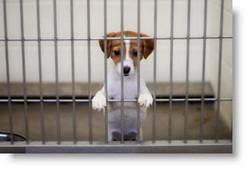
A bored, unhappy husky can develop behavioural problems and end up, like so many do, in the care of an animal charity such as the RSPCA. As well as exercise and attention, huskies need regular grooming.
There are plenty of breeders who offer huskies for sale, and many will be enthusiastic and very knowledgeable about the breed. A good breeder will be happy for you to meet the puppies’ mother and spend time with the litter to help you decide which puppy you want to take home. By meeting the mother and seeing the puppies in their natural environment, you will learn a lot about what sort of dogs they will become: their temperament will most likely be similar to their mother’s, and if they seem happy and healthy and to have been allowed to socialise properly they will become happy, healthy dogs.
Whilst it is true that many huskies in rescue or rehoming centres are there because their owners have not been able to cope or care for them properly, it is not true that they cannot be loving, well-behaved pets if cared for by the right family. It is usually the previous owner’s lack of proper care that has led to a husky being put up for re-homing, rather than anything wrong with the husky itself. Staff at the RSPCA will be able to advise you about whether a particular dog will suit your family and will be able to give you information about its temperament and background. They will also have made sure that the dog has been neutered/spayed and vaccinated, so you will be sure to have a healthy dog.
If you have the time to care for a husky and educate yourself about how to manage them properly, you can adopt a husky and end up with a very good pet that the whole family will adore.



 RSS Feed
RSS Feed